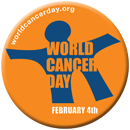Genetics
Time to Dispel Some Cancer Myths
The illness that dare not speak its name
Posted February 4, 2013

While most of us are perfectly comfortable talking about life-threatening illnesses like heart disease and AIDS, cancer remains shrouded in myth and mystery. Many people refer to it as “The Big C” or “The C-Word,” as if fearing that merely pronouncing the word “cancer” might cause them to develop the dreaded disease.
The contrary is true, however: the more openly and constructively we can speak about cancer, the greater our chances of health and survival. For there are many simple, inexpensive yet highly effective things we can do to reduce our risk of getting cancer, or to improve our chances of recovery when we do have the disease. It’s just that many of us still don’t know about them.
The Union for International Cancer Control (UICC), organizers of World Cancer Day which is held every year on February 4th, is challenging some of the most pervasive misconceptions surrounding cancer. Here are the four myths that, they argue, are holding us back from a greater understanding of the causes of cancer, which, if they were better understood, could improve our odds of avoiding or overcoming the disease.
Myth 1: “Cancer is my fate”
Many people think cancer is some kind of lottery: either you get it or you don’t, and it’s mostly about genes. In fact, genes are implicated in no more than 10% of cancer cases (and even when you do have genes that predispose you to cancer, lifestyle factors can modify the risks these bring).
Meanwhile, organizations like the American Institute for Cancer Research estimate that one-half of the cancer cases could be prevented through healthy lifestyle habits, such as eating a healthy diet, maintaining a healthy weight, getting regular physical activity, limiting alcohol and avoiding tobacco.
Exposure to environmental causes of cancer in our personal and professional lives, including exposure to indoor air pollution, radiation and chemicals in our food, are also preventable causes of cancer.
Finally – and particularly in developing countries – chronic infections cause approximately 16% of all cancers globally, and almost 23% in developing countries. Several of the most common cancers in developing countries such as liver, cervical and stomach cancers are associated with infections with hepatitis B virus (HBV), the human papillomavirus (HPV), and the bacterium Helicobacter pylori (H. pylori), respectively. With appropriate screening tests, these cancers can be caught in their early stages and treated effectively.
Individuals, policy makers and healthcare professionals need to understand that many cancers can be prevented, and that effective treatments are available. “…[O]nce people understand basic information about cancer and know how to access services, they tend to come for the services,” the UICC states.
So let’s talk to our children, their teachers, our doctors and nurses, our friends and family and help raise their awareness of the small lifestyle changes that can pay big dividends. Coming from cancer survivors, such communication is particularly powerful.
Myth 2: “Cancer is a death sentence”
Until the advent of modern screening methods, cancer was often diagnosed at a late stage when chances of survival were slim. However, thanks to improved testing, cancers can be detected at a much earlier stage, thus improving outcomes.
For example, Australia’s breast screening program, established in 1991, has helped achieve an almost 30% reduction in mortality from breast cancer over the last two decades, according to the UICC. Cervical cancer rates in wealthier nations plummeted once Pap testing was introduced broadly – in some countries such as the UK, mortality has halved between 1990 and 2010. Meanwhile, twelve million cancer survivors in the U.S. are living proof that a cancer diagnosis does not have to be a death sentence.
Cancer screening is controversial. Some tests can cause serious problems (e.g. colon cancer screening can damage the lining of the colon). Moreover, false-positive results (indicating that there is cancer when there really isn’t) can cause anxiety and are usually followed by more tests and procedures, which also have risks. There is also the risk of false-negative results (indicating that there is no cancer when there really is) that may delay necessary medical treatment.
However, if you or someone you know has a heightened cancer risk (for instance, if you have two or more first-degree relatives who have had cancer; or have certain gene mutations that have been linked to cancer, then get the recommended screenings.
For more information, please consult the National Cancer Institute’s excellent web pages on the different types of screening available and its discussion of the pros and cons of screening.
Also, don’t ignore unusual symptoms – see your doctor if you think something’s up. That timely visits to the doctor can save lives is illustrated by a study published last week in the British Journal of Cancer, which found that Britain’s “stiff upper lip” culture may explain why it lags behind other high-income countries when it comes to beating cancer. Some 15% of British respondents were said they were embarrassed to consult their doctors, and 34% said they didn’t want to waste their doctor’s time with their health complaints.
Myth 3: “Cancer is a disease of the wealthy, the elderly and developed countries”
In fact, cancer is a global epidemic that affects all ages and income groups, with developing countries bearing a disproportionate burden. Of the 7.6 million global deaths from cancer in 2008, more than 55% occurred in less developed regions of the world, according to the UICC. By 2030, 60-70% of the estimated 21.4 million new cancer cases per year are predicted to occur in developing countries.
Apart from supporting international cancer charities, there is little you or I can do to lower the disease burden in the developing world. However, since cancer can strike at any age, the time to start taking precautions is now, not the day you retire. Get in the habit of eating healthy, being physically active and having a healthy weight, managing your stress levels and avoiding unhealthy chemicals, and support others -- your chidlren, partner, friends or family -- in doing the same.
Myth 4: “Cancer is just a health issue”
In truth, cancer has wide-reaching social, economic, development and human rights implications. An approach including all areas of government (not just health ministries) is necessary for the effective prevention and control of cancer.
As the UICC states, most premature cancer deaths are preventable by making policy changes in sectors in and beyond health such as education, finance, development, transport, agriculture, etc. A “whole-of-society” approach that includes NGOs, academia, the private sector, and people living with and affected by cancer is just as important to support cancer prevention and control.
Talking openly about cancer, and pressuring our governments to create “anticancer” environments (health care that’s accessible to all members of society, affordable healthy food, clean air, safe roads to walk and cycle on, etc.) can help lower the great cost – both human and financial – of cancer.
For more information on World Cancer Day and what you can do to reduce the world-wide burden of the disease, visit the World Cancer Day website: http://www.worldcancerday.org/.
Copyright Conner Middelmann-Whitney. Conner is a nutrition coach, health-cooking instructor and author of Zest for Life: The Mediteranean Anti-Cancer Diet. She is based in Boulder, Colorado; for more information about her work, visit her website: www.nutrelan.com.




